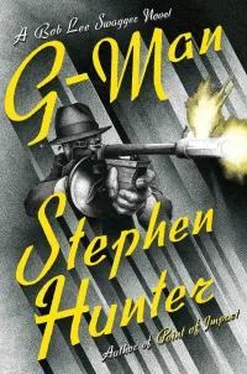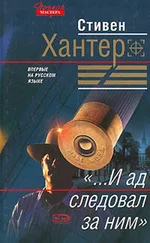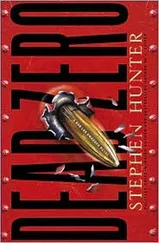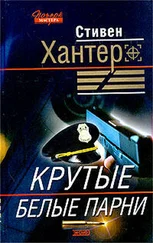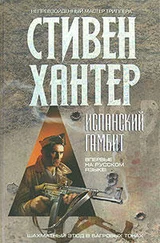Стивен Хантер - G-Man
Здесь есть возможность читать онлайн «Стивен Хантер - G-Man» весь текст электронной книги совершенно бесплатно (целиком полную версию без сокращений). В некоторых случаях можно слушать аудио, скачать через торрент в формате fb2 и присутствует краткое содержание. Жанр: Старинная литература, на английском языке. Описание произведения, (предисловие) а так же отзывы посетителей доступны на портале библиотеки ЛибКат.
- Название:G-Man
- Автор:
- Жанр:
- Год:неизвестен
- ISBN:нет данных
- Рейтинг книги:3 / 5. Голосов: 1
-
Избранное:Добавить в избранное
- Отзывы:
-
Ваша оценка:
- 60
- 1
- 2
- 3
- 4
- 5
G-Man: краткое содержание, описание и аннотация
Предлагаем к чтению аннотацию, описание, краткое содержание или предисловие (зависит от того, что написал сам автор книги «G-Man»). Если вы не нашли необходимую информацию о книге — напишите в комментариях, мы постараемся отыскать её.
G-Man — читать онлайн бесплатно полную книгу (весь текст) целиком
Ниже представлен текст книги, разбитый по страницам. Система сохранения места последней прочитанной страницы, позволяет с удобством читать онлайн бесплатно книгу «G-Man», без необходимости каждый раз заново искать на чём Вы остановились. Поставьте закладку, и сможете в любой момент перейти на страницу, на которой закончили чтение.
Интервал:
Закладка:
“Hi, it came, thanks.”
“I hope it helps,” she said.
“Well, you never know, I might pick something up, even if the chance is small.”
“How much longer in Little Rock?”
“I’m done now. Heading to Blue Eye tomorrow, Andy Vincent is going to meet me. I told him I want to keep it discreet, no conquering-hero-returns-home kind of thing, and, again, I doubt if much is left of the old man. Hell, there wasn’t much left of my father, I don’t expect anything from a generation earlier.”
“All right.”
“And then to D.C. to see if Nick’s fished anything out of the files. I should be home in three or four days.”
“I’ve heard that before,” she said.
At last he turned to the envelope. He opened it and took out a single four-by-six-inch sheet of ancient paper and, turning it over, looked into the harsh face and unforgiving eyes of Charles Fitzpatrick Swagger, snapped one fine spring day in 1926. It had been his own father Earl’s only acknowledgment that he had a father, and it had been in a tattered old Buster Brown shoe box with other Earl documents and souvenirs that he’d last looked at twenty years ago. He’d noted the photo but not checked it at all.
Now he stared at the murky sepia, turning it back over to read the inscription, “Daddy 1926,” in what had to be his grandmother’s flowery fountain-pen script.
Charles had a man-killer face, all right, if you believed in such things, and Bob could see both his own and his father’s bone structure in the thinness and length, the prominence of cheekbones and hollowness of scraped-clean cheeks, the severe and unyielding prows of nose. The mouth looked genetically incapable of cracking a smile; its hard dash might have been rectitude or moral authority or self-belief or just plain cop-tough.
The man leaned against a rural fence on a sunny day and posed for his wife’s Brownie box camera. He was into a cowboy kind of look in 1926, with a lot of hat covering up his hairline, a white Stetson twelve-galloner, with prim, flat brim circling under the bullet-blunt crown. He wore a dark three-piece suit with the insouciance of someone who wore a dark three-piece suit every day of his life and would not think of stepping off the porch without such. The shirt was white, with a round, stiff collar held tight by a collar bar, above which a black tie sprung, which hung down his chest and was swallowed by the tightness of his dark vest. A star-in-circle badge dominated the left lapel, and no one could miss it. Around his waist he’d cinched tight a much-tooled gun belt, its loops displaying a healthy number of .45 Colt big boys, making the statement that no matter how hot and heavy it got, he would not be running low on ammo. On his right hip, revealed by a suit coat dramatically tucked back by a seemingly casual hand in pocket, he displayed from the forward angle the familiar plow curve of the 1873 Model Colt, the Peacemaker, that had decorated every Western or Southern lawman’s belt for close to fifty years, as well as appearing in enough cowboy movies to win its own Oscar. It was probably a ceremonial gun, its lines proclaiming the heritage of the Western lawman, but for real work he’d use the Government .45, which he’d used so well in the trenches. Only the hammer and curve of the butt strap of the Peacemaker and the ivory of its grips were visible above the embrace of the holster, but Bob looked and saw strong, large gunman’s hands that would have been adept at the draw and could probably put lead in any antagonist out to forty yards or so in less than a second, even with a single-action antique — so obsolete in 1926!—like this one.
Bob looked at the face. Born in 1891, Charles would have been thirty-five at the time, Earl would have been nine, Bobbie Lee, Bob’s namesake, not yet conceived. Perhaps little Earl clowned just out of the frame in this frozen moment of long-ago life, and Daddy was going to take him for an Eskimo Pie at the general store in a few minutes. Or perhaps he’d beaten him raw for some infraction of a code only he knew yet enforced with the rigor of a prison guard, and the child languished in a locked cellar room, sore everywhere, but mostly in the mind.
You couldn’t tell. Not a bit. It was just a picture of a mid-’20s American lawman, proud of self and devotion to duty and social rectitude, incorruptible, brave, willing to shoot it out with anybody for the safety of the citizen. It was almost a poster for a movie called I, Lawman that only got made in its country’s mind, and like all symbols, it did not yield its secrets easily.
PART II
CHAPTER 7
THE BANKERS BUILDING
CHICAGO
June 1934
He squared it with the judge, who agreed it should be kept quiet, as Charles’s absence might lure criminals. He told no one else except his deputies and his secretary where he was going and what he was doing, and them as little as possible. He packed his two suits and six white shirts and one black tie in his one suitcase, along with a pair of Sunday go-to-church brown oxford long wings, a pair of dungarees for rough work, and underwear and handkerchiefs. And his elaborately engraved .45 shoulder holster, though he left his own gun at home. He also took five hundred in cash, in small bills, from a squirrel fund he’d started on his own behalf, unknown to anybody.
His wife drove him to the station, not even in Little Rock but a full day’s drive away, across a flat and bleak landscape littered with broken-down trucks, past sad Hoovervilles rotting in the middle of nowhere, past fallow fields ruined by drought, and parched forests and dry riverbeds. The destination was Central Station in Memphis, where no one would see him by accident.
Bobby Lee had the backseat. He was handsome enough, a towhead, long and lithe at eight, who should have been the leader of the gang. But his hair was always a thorny mess, his mouth full of drool that spilled onto and encrusted his lips, and his tongue never seemed quite right, the way it probed and rolled like a mollusk of its own accord. He couldn’t sit still either, and was always twisted up as if his own limbs were rope, ensnaring him, and he squirmed and bumped against them.
“Da go bye,” he said.
“Yes, Bobby,” said Charles. “For a time, Da go bye. You be good and take care of Mommy.”
“Da go bye,” Bobby said again, for answering wasn’t his forte.
She finally said, “Where will you stay?”
“Well, guess I’ll rent a studio somewhere. One room, foldout bed. Can’t have roommates, my nightmares’d wake them up.”
“You should get help, Charles.”
“Some doctor asking me questions about my secrets? It’s just war things, no way to get rid of them. I’ll just sweat them out. Nobody needs to know my business.”
“You don’t share much with me. You’re so locked up.”
“You knew that. It ain’t like I pulled it on you.”
“I thought you’d soften. But that war just hardened you. You’ll never soften.”
“Da go bye,” said Bobby from the rear, and in the mirror Charles saw that his boy’s nose had leaked a gobbet of snot and, leaving a glistening trail, it had lodged in the corner of his mouth.
He caught Illinois Central 244 to Chicago. It was a rum-dum old thing, its black steam engine a manifesto of industrial purpose, in the colors of grime and grease, spewing cumulus roils of smoke as it went out into the world in general, and its own nine cars in particular, so that no window was clear, the smell of carbon lurked everywhere, and tears came to the eyes. The caravan behind it was all pre — Great War stock, with the smell of must and mold in the cars, to say nothing of sweat, vomit, and blood. A lot of living, and even some dying, had been done in those old cars. At least the government had sprung for a sleeping berth in the Pullman car and he didn’t have to ride sitting up with all the poor Negroes headed north in hope of better times. The meal in the dining car, served by waiters in jackets that may have once been white but were no more, was certainly edible, but well beneath the mythical standard of the fabulous Panama Ltd., one of the most luxurious trains in America, which had regularly run this up from New Orleans route until two years ago, but as the Depression wore on and times got harder, no matter what Mr. Roosevelt promised, the big money went away, and luxury services like gilded vacation trains with it.
Читать дальшеИнтервал:
Закладка:
Похожие книги на «G-Man»
Представляем Вашему вниманию похожие книги на «G-Man» списком для выбора. Мы отобрали схожую по названию и смыслу литературу в надежде предоставить читателям больше вариантов отыскать новые, интересные, ещё непрочитанные произведения.
Обсуждение, отзывы о книге «G-Man» и просто собственные мнения читателей. Оставьте ваши комментарии, напишите, что Вы думаете о произведении, его смысле или главных героях. Укажите что конкретно понравилось, а что нет, и почему Вы так считаете.
